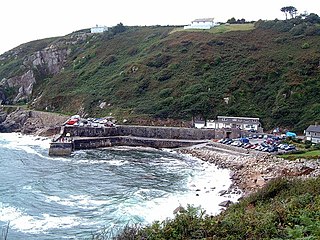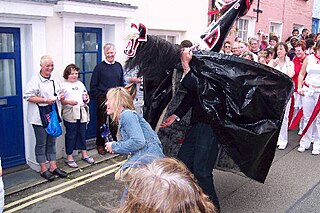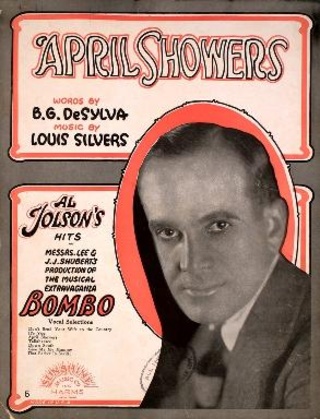Related Research Articles

Lamorna is a village, valley and cove in west Cornwall, England, UK. It is on the Penwith peninsula approximately 4 miles (6 km) south of Penzance. Lamorna became popular with the artists of the Newlyn School, including Alfred Munnings, Laura Knight and Harold Knight, and is also known for former residents Derek and Jean Tangye who farmed land and wrote "The Minack Chronicles".

The most famous Furry Dance takes place in Helston, Cornwall, United Kingdom. It is one of the oldest British customs still practised today. The earliest mention seems to be in a letter to the Gentleman's Magazine for 1790 where the writer says "At Helstone, a genteel and populus borough town in Cornwall, it is customary to dedicate the 8th May to revelry. It is called Furry Day". The dance is very well attended every year and people travel from all over the world to see it: Helston Town Band play all the music for the dances.
Cornwall is a Celtic nation with a long musical history. Strengthened by a series of 20th century revivals, traditional folk music has a popular following. It is accompanied by traditions of pipers, brass and silver bands, male voice choirs, classical, electronic and popular music.

West Country English is a group of English language varieties and accents used by much of the native population of the West Country, an area found in the southwest of England.
"Cotton-Eyed Joe" is a traditional American country folk song popular at various times throughout the United States and Canada, although today it is most commonly associated with the American South. The song is mostly identified with the 1994 Rednex version, which became popular worldwide. The song is also an instrumental banjo and bluegrass fiddle standard.

St Buryan is a village and former civil parish, now in the parish of St Buryan, Lamorna and Paul in Cornwall, England, United Kingdom. In 2011 the parish had a population of 1412.

Brenda Wootton was a Cornish folk singer and poet and was seen as an ambassador for Cornish tradition and culture in all the Celtic nations and as far as Australia and Canada.
"Seventeen Come Sunday", also known as "As I Roved Out", is an English folk song which was arranged by Percy Grainger for choir and brass accompaniment in 1912 and used in the first movement of Ralph Vaughan Williams' English Folk Song Suite in 1923. The words were first published between 1838 and 1845.

The 'Obby 'Oss festival is a folk custom that takes place each 1st of May in Padstow, a coastal town in North Cornwall. It involves two separate processions making their way around the town, each containing an eponymous hobby horse known as the 'Obby 'Oss.

"April Showers" is a 1921 popular song composed by Louis Silvers with lyrics by B. G. De Sylva.
"The Floral Dance" is an Cornish song describing the annual Furry Dance in Helston, Cornwall, UK.
Sweet Nightingale, also known as Down in those valleys below, is a Cornish folk song. The Roud number is 371.
The White Rose is a traditional Cornish folk song, the chorus of which appeared in the film Ladies in Lavender (2005). The song remains popular and has been recorded by many of the Cornish male voice choirs and is often performed at funerals. In 2001 it was read at the funeral of Rick Rescorla, Cornish hero of 9/11.
"Come, all ye jolly tinner boys" is a traditional folk song associated with Cornwall that was written about 1807, when Napoleon Bonaparte made threats that would affect trade in Cornwall at the time of the invasion of Poland. The song contains the line Why forty thousand Cornish boys shall knawa the reason why.
The Jolly Waggoner is an English folk-song.
"Pomona" is a folksong originating from Manchester. It has many similarities with a song called Lamorna, which is popular in Cornwall.
Jolly Roving Tar is a traditional Newfoundland folk song. In its 19th-century version, the song relates the story of Susan, lamenting the wanderings of her beloved "tar", or sailor, William, who is at sea, and deciding to follow him in her father's boat. The title is also applied to the folk song* "Get up, Jack! John, sit down!", a reel of unknown provenance in which some, but not all, versions includes the line, "Come along, come along, my jolly brave tars, there's lots of grog in the jars."

Kissing Time, and an earlier version titled The Girl Behind the Gun, are musical comedies with music by Ivan Caryll, book and lyrics by Guy Bolton and P. G. Wodehouse, and additional lyrics by Clifford Grey. The story is based on the 1910 play, Madame et son Filleul by Maurice Hennequin, Pierre Véber and Henry de Gorsse. The story is set in contemporary France, with a glamorous actress at the centre of a farcical plot of imposture, intrigue and mistaken identity.
Fish and Tin and Copper is a traditional folk song/ballad associated with Cornwall, and dealing with the legend of the devil visiting Cornwall and being frightened away, fearing that he'd be made into a Cornish pasty filling.
Ten Thousand Miles Away is a sea shanty and bush ballad whose writing and composition are attributed to Joseph B. Geoghegan.
References
- ↑ Davey, Merv (1983) "Hengan": Traditional Folk Songs, Dances and Broadside Ballads Collected in Cornwall. Redruth: Dyllansow Truran ISBN 0-907566-71-5
- ↑ Title: Lamorna. Song, words by L. Johnson,etc Composer: Goffrieì. Louisa Juliana Publication details: London: Leonard & Co.. 1910
- ↑ "Way Down to Pomona - Manchester Central Library – Archives+". www.archivesplus.org.
- ↑ Geographers' A-Z Map Company Limited Manchester: a premier street map; edition 5. Sevenoaks, [c. 1980]
- ↑ Gardens (en), Parks and. "Pomona Gardens". Parks & Gardens.
- ↑ Ashton, Geoffrey Lost Rivers of Manchester
- ↑ Frederick J Davis & Ferris Tozer, Fifty Sailor Songs or Chanteys, 1887
- ↑ "The Celtic Lyrics Collection - Lyrics". celtic-lyrics.com.
- ↑ "The Black Brothers". Archived from the original on 8 July 2011. Retrieved 1 May 2010.